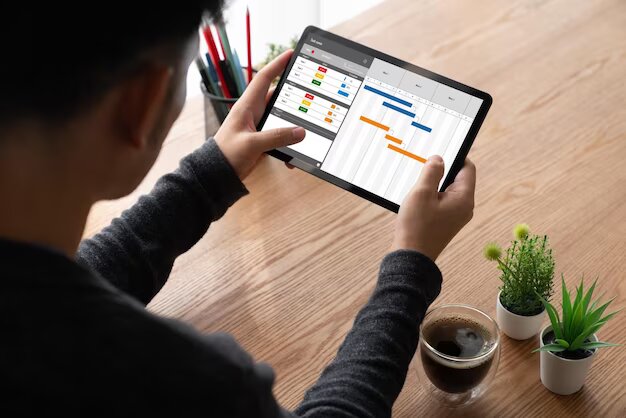Tracked Or Trusted? Navigating The Minefield Of Employee Tracking Apps In The Remote Work Revolution
by Ankita Tripathy Business Intelligence 03 February 2024

If we evaluate as a whole, most companies, whether big or small, are now moving towards positive and new technology, plus work standard shifts. One such trend or rather a massive change in the work standards is remote work. Now, for employees, it indeed is beneficial, but on the contrary, for the employers, the scenario is different. Employee tracking apps have the latent answer to the disruptions.
With the ever-increasing rate of remote work implementation, businesses, however, are facing the challenge of managing their geographically dispersed workforce. To tackle this issue, employee tracking apps have emerged as the best possible solution. These software solutions promise to streamline remote work management. However, before jumping on board with these apps, it is important to evaluate their effectiveness and consider whether they truly deliver on their promises or not.
Accountability: Friend Or Foe?
In an office environment, some individuals tend to thrive in a structured setting. Tight deadlines and the watchful eye of a manager surely help maintain productivity to a good degree. However, an employee tracking app can be a significant aid to ensure that everyone is pulling their weight in the right direction, even if they are miles away from working remotely.
For a manager overseeing teams across different time zones, knowing that everyone is logged in and on task can be a game-changer. Nevertheless, it is crucial to remember that trust is a two-way street before hailing these apps as the ultimate solution for productivity as one of the integral components in the business system.
Transparency: Building Trust In The Digital Age

It is essential to maintain open communication with employees regarding the use of monitoring applications. It is not advisable to keep employees in the dark about their usage, which can lead to a lack of trust and ultimately result in unwanted consequences. It is important to clearly explain the purpose of the application, the data it collects, and how it will be utilized so as to boost employees’ morale and mutual trust.
This can be compared to a digital prenuptial agreement, where expectations are set out in advance, and surprises are avoided in the future. Employees can have peace of mind knowing that their employer is not monitoring their every move in a Big Brother-style manner.
Privacy: Employee Tracking Apps Strikes A Balance
Privacy is an important aspect to consider when it comes to monitoring employees’ online activities. While it is necessary to track work-related activity, excessive monitoring can make employees feel uncomfortable and intruded upon. It is important to strike a balance and respect employees’ privacy. Remember that employees are human beings and not machines, hence, building trust is crucial for a healthy work environment.
Employers should avoid scrutinizing their employees’ activities, such as online shopping or social media browsing, during their breaks. By respecting employees’ privacy, employers can create a work environment that fosters trust and mutual respect.
Statistics highlight the need for this balance:
- According to a recent survey conducted by GetApp on a hundred businesses in the year 2022, it was found that a whopping seventy-four percent of them spend up to eight hours taking a hawk-eye on the employee hours every two weeks. This finding has raised concerns about the efficiency of such practices and the possibility of employee resentment.
- According to a survey conducted by Clutch. co among 400 US employees, it was found that only 21% of the participants were aware of their company’s monitoring practices using designated software. This finding highlights a potential gap between what employers intend to do and what employees are aware of, emphasizing the need for more transparency and communication in the workplace.
The Burnout Blues: Avoiding The Human Cost

It’s one of the basis to consider the impact on individuals when implementing constant monitoring in the workplace. The pressure of being constantly watched can lead to stress, anxiety, and, ultimately, burnout. Even when using apps for micromanagement, employers need to be mindful of the negative effects it can have on their employees.
Encouraging breaks, promoting healthy work-life boundaries, and prioritizing employee happiness are key to maintaining a productive and innovative workplace. By recognizing the value of individual contributions, companies can foster an environment where employees feel valued and empowered to share their unique ideas.
Studies support this concern:
- A study conducted by Top10VPN in 2023 revealed that there has been a significant increase in the demand for employee monitoring software, with an upsurge of 58% since the start of the pandemic. This drastic rise in demand calls for a thorough analysis of the potential effects on the well-being of employees.
- According to a study, employees were found to be 7% more effective when they were aware of being monitored. This implies that transparency and trust can play a significant role in mitigating some of the negative effects of monitoring.
So, Are Employee Tracking Apps The Answer? It’s Complicated.
Undoubtedly, employee tracking apps are becoming increasingly popular in today’s workplace, but their effectiveness is not always straightforward. While some employees find these apps useful, others feel trapped by their constant monitoring.
To make the most of these tools, it’s important to implement them thoughtfully and with clear intentions. By prioritizing transparency, trust, and employee well-being, we can prevent these apps from becoming oppressive and instead use them to build a culture of trust and flexibility that supports remote work. The result is increased productivity and a better work experience for everyone involved.
In the era of remote work, technology has played a vital role in bridging the gap between employees and their work. However, it’s not just the technology that makes remote work successful. In addition, mastering soft skills is equally important.
Though often overlooked, clear communication, effective collaboration, and empathy are the ingredients that make remote work truly thrive. When team members communicate effectively, collaborate efficiently, and empathize with one another, it creates an environment where ideas flow freely, and everyone feels respected and valued.
Remote work has become a popular trend in recent years, and it seems like it’s here to stay. However, it can be challenging to strike the right balance between accountability and trust in a remote work environment.
But, by thoughtfully leveraging technology, encouraging open communication, and prioritizing employee work-life balance, we can create a future where remote work thrives. It’s important to note that no matter how advanced the employee tracking software might be, it cannot measure the value of a happy and efficiently engaged employee. That is the real superpower of productivity.
The Future Of Employee Tracking

As employee tracking apps continue to advance with evolving technology, their capabilities, and potential applications are likely to expand as well. However, it is crucial to keep in mind the fundamental principles while implementing such technology. As we look into the future of this technology, here are some important factors to consider:
- As artificial intelligence continues to advance, likely, employee tracking applications will likely increasingly utilize automation to recognize patterns and irregularities in work behavior. This can be highly beneficial for identifying potential productivity obstacles or alerting to possible issues. However, it’s also equally important to ensure that these systems are implemented ethically and transparently, avoiding any biases or discriminatory practices that may arise.
- Many apps are now moving away from simply tracking employee activity and instead focusing on providing insights and guidance to help employees enhance their skills and performance. This shift towards a more developmental approach has the potential to boost employee engagement and encourage professional growth. By prioritizing upskilling and development, companies can create a more motivated and productive workforce.
- As companies increasingly rely on employee tracking technologies to monitor productivity and streamline operations, the need for comprehensive regulations and ethical guidelines has become more pressing. Such frameworks are necessary to safeguard employee privacy and ensure the responsible use of this technology. It is suggested to have open discussions and involve all stakeholders in the process of determining the best regulations and ethical guidelines that balance the benefits of employee tracking with their privacy and ethical concerns. This will help to create a fair and safe working environment.
Employee tracking apps have the potential to provide a range of benefits such as improving communication, streamlining workflows, and promoting accountability. However, it is important to maintain a balance between the advantages of such apps and several noteworthy concerns.
Conclusion
To ensure that these employee tracking apps are used ethically and thoughtfully, we need to prioritize mutual respect and shared success. It is crucial to remember that technology is a tool, and its impact depends on how we use it. By using these apps responsibly, we can create a future where remote work thrives while respecting the boundaries of employees.
Read Also:







































































































